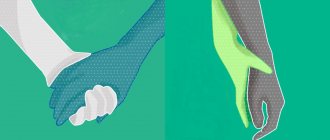Konstantin, 57 years old, Moscow
Blinded at age 24 as a result of complications from the flu. His vision faded slowly, and while studying at the Polytechnic Institute, Konstantin prepared for life in the dark - he went to museums, planned the future. I managed to complete my studies by ordering audio recordings of books from the library. At first my wife helped me read, but she soon left. In Soviet times, he worked as chairman of the VOS committee at an enterprise that made Elektronika calculators; now he teaches computer science in rehabilitation hospitals, teaching the blind to work with Braille equipment.
KonstantinPhoto: Anna Ivantsova
Dreams: “Yes, somehow I don’t particularly dream, except maybe naked women, and when I saw them, I somehow didn’t dream much... but just today I dreamed about how to make a staircase in a house. In order not to despair, you need to have a goal in life. And so I came up with a goal for myself - to build a house near Sergiev Posad. I tried to take out a mortgage, but they don’t give it to people with disabilities, but that’s what I do: I took out a loan, bought fifteen acres of land, and gave it away; took a loan - made a foundation, paid it back; loan - log house, loan - gas and so on. The house is small, six by six meters in total. I spent only 146 thousand on one staircase, took out a separate loan for it, and still couldn’t understand what it should be like. And then - once! - and in a dream I saw it directly: what steps, where are the turns, how to place the posts and all that. Then, maybe I’ll get myself bees - a vegetable garden, a garden, I’ll dig around there - and I’ll cope with the bees, I’ll need a little help with this queen, but that’s fine...”
Why are people who are blind from birth more likely to have nightmares?
The only distinguishing feature of people who were blind from birth was a noticeably increased frequency of nightmares. Typical dreams of representatives of this subgroup were fears of death under the wheels of a car, losing a guide dog, or falling into a deep hole. The researchers did not delve too deeply into the essence of the phenomenon, but expressed their assumptions. In their opinion, such nightmares can serve for blind people as a “shock absorber” for daily worries. Most problems for individuals in this category revolve around feelings or lack thereof. All these experiences, one way or another, find a way out in night dreams.
Found a violation? Report content
Sergey, 37 years old, Shakhty (Rostov region)
I lost my sight at the age of 26. Sergei had a difficult childhood - his stepfather beat him, then his parents sent him to a boarding school. At eight or nine years old, he had to hand over bottles to raise money for food and at least something to eat. After school there was nowhere to live and nowhere to work. But in 2002, Sergei went to work on construction sites in Sochi, and life began to improve - he bought fashionable clothes, made friends, and even decided to save up for a house. But there he was hit by a car and received a traumatic brain injury, as a result of which he lost his sight and hearing. The court found the driver guilty and sentenced him to a suspended sentence and payment of 110 thousand rubles for treatment. However, Sergei has not yet received the money and still hopes that someone will help him do this.
SergeyPhoto: Anna Ivantsova
Dreams: “Of course, I see dreams as before, only now I have this: if I dream something good in a dream - for example, Putin, who smiles, shakes my hand and appoints a person who will help me get my money and get cured, then the next day something bad always happens to me. And the best dream was this: I met a classmate with whom we were very friends, and whom I haven’t seen since, and he was so happy to see me and said: “Let’s go visit me, I’ll give you a car.” And I said to him: “What a car, I’m blind now.” And he was like: “Yes, everything is fine with you, let’s go!” Well, we went, and I saw that everything was fine, everything was the same as before! And he has such a big house and several cars - black and blue foreign cars. He says: “Now let’s sit, eat, and choose which one you want.” I'm so happy - well, that's it now! They sat down at the table: “And this,” he said, “is my wife, remember? We also studied together, Anya.” I look and definitely remember! They started joking and having fun there, and there were a lot of children, about five of them. And then I woke up."
Comparison within the group of blind people
But if we consider the experience of people within the group of blind people itself, then certain differences were observed here too. Participants who were not blind since birth had some visual experience that they successfully stored on a subconscious level. Consequently, having already acquired blindness, these people continue to see in their dreams visual images familiar from childhood.
Cities in Sicily covered in ash from Mount Etna: photo
The girl threw a coin into a vase with fading tulips and showed the result
Oranges and grapefruit: preparing a citrus tart with the most delicate cream
The research team's report noted that people who were not blind from birth described the visual effects of the dream in detail orally, using a rich vocabulary. Sometimes the listeners began to have doubts: are there really blind people in front of them? Scientists also managed to identify an interesting pattern. The longer a person remained blind at the time of the experiment, the poorer and shorter his memory was, the more foggy and indistinct the visual impressions felt.
Kristina, 21 years old, Izhevsk
She was born blind, her parents tried to cure her, went to ophthalmologists, and at the age of nine and thirteen, Christina underwent two operations. After the second, even faint sensations of light disappeared, and complete darkness set in. She says that she can use her “third eye” to imagine who is in front of her, and when asked about her parents, she replies that they are “unfortunately sighted” - unfortunately, because it is more difficult for the sighted and the blind to understand each other. Although my mother’s work is stressful, sometimes there are quarrels, but in general my relationship with her is good, they give each other advice and support in everything. Everything was difficult with dad, and two years ago he died, but now you can see him in your dreams.
KristinaPhoto: Anna Ivantsova
Dreams: “I was at home and it was as if I had ordered a tablet for myself, so good, with Windows, and my father came, saw and shouted: “But wasn’t it fate to consult with me, or what, before ordering?!” Once in my life it was even worse: I was listening to a romance novel, and he, apparently, was not in the mood, said: “Turn off your music!” - and my mother said: “This is not music, this is an audiobook,” and he grabbed the receiver and threw it against the wall... And the best dream was this: I wrote a poem, I know a lot of poems by heart and love to read them out loud - Yesenin, for example. . But for some reason I can’t compose it myself - I tried several times to write at least one poem, the first time at the age of sixteen and many times since then, for some reason it doesn’t work. And in a dream it suddenly happened, I was in some building and even read my poem to someone, then I woke up and wanted to actually write it, but I didn’t remember anything.”
Monochromacy
Monochromasia is congenital complete color blindness. Monochromats see the world in black and white. In more complex cases, they experience photophobia and complete loss of vision.
The thing is that in a healthy person, 3 cone mechanisms are fully functioning; with monochromasia, the work of the cones - the peripheral processes of the light-sensitive cells of the retina - is disrupted. Therefore, the entire world around us is painted in a black and white palette. Monochromats often cannot be in the sun without glasses, because sunlight, affecting the retina, causes severe pain to their eyes.
To accurately diagnose the disease, ophthalmologists usually use Rabkin’s polychromatic tables or electroretinography. If you notice any symptoms of monochromasia in a child, you should immediately seek help from a specialist. However, it is still not possible to completely get rid of the disease.
Andrey, 35 years old, Moscow
Andrey came to Moscow from Anzhero-Sudzhensk, Kemerovo region. He is engaged in massage and personal practices; clients come to his home and find themselves in a dark room, where he teaches them to relax and feel their body. His vision was lost as a result of an accident - he received a thermochemical burn due to an explosion that he and his friends made in the yard while mixing substances. The face and eyes were covered with a chemical film, which doctors washed off only after 12 hours, and the mixture eroded the cornea of the eye. Andrei was unconscious and says that he experienced clinical death, and this is completely different from what they usually talk about.
AndreyPhoto: Anna Ivantsova
Dreams: “When you get crazy, get nervous with some fools, then you have colorful dreams. And when everything is calm, smooth, I don’t dream, because I don’t need it. Dreams are late for reality; there are more wonderful opportunities in the living world. When the sight of the blind is restored, they are horrified by the ugliness of this world, do you know that? If I focus on my blindness, I will try to distinguish myself, as if I am different - this is somehow strange, this is not a human characteristic, these are just physical qualities.”
The results of the experiment were amazing
Oddly enough, the blind participants reported a much richer and wider range of feelings and experiences to the scientists compared to their healthy counterparts. Sleep could replenish functions that were once lost. Blind people reported more intense sensations of sound, touch, taste and smell. However, ordinary people, as a rule, remember only visual sensations.
Functional blindness
In addition to absolute blindness, there is also functional blindness. Definitions of functional blindness vary by country or medical organization.
In the United States, functional blindness is a visual impairment in which the best eye, already at maximum correction, sees worse than 20/200. The World Health Organization defines blindness when the better eye, under optimal conditions, sees no better than 20/500 with less than 10 degrees of vision.
What functionally blind people see depends on the severity of the blindness and the type of impairment.
Do blind people dream?
We all love to sleep. It is during sleep that our brain processes the information received during the day, forms new neural connections and rests. It’s not for nothing that we spend up to a third of our entire lives sleeping, and with an average duration of 70 years, this is as much as 23 years!
All people are capable of dreaming (with rare exceptions). People suffering from certain mental illnesses are unable to perceive dreams. Moreover, even animals dream of some images: horses, dogs, cows and other four-legged animals.
Why do we have dreams?
Sleep frees the brain from overload with unnecessary information. There are two stages of sleep: fast and slow sleep. They occupy 20% and 80% of total sleep, respectively. Some people dream often, others rarely. But actually it is not. We dream every 90 minutes. But we can remember them only during the fast phase of sleep. Therefore, a person remembers only ten percent of all his dreams.
The average person often dreams about what he saw. Do blind people dream and what do they dream about?
Surely they see it. But their dreams are completely different. And they have nothing to do with our dreams.
Those who have been deprived of vision all their lives see auditory, olfactory, and tactile images in their dreams and interpret them in their own way. Blind people cannot see colors and objects around us. They undoubtedly know what this or that object means. They can feel its shape. But their brain cannot imagine them concretely and manifest them in a dream. And the name of flowers for them is just a set of letters.
Researcher Elinor Deitch conducted a study involving 67 blind schoolchildren from Illinois. She found that children often dream in the form of sounds. One girl said she dreamed that her mother was falling apart. And she understood this from the crunch of bones. Another girl who participated in the experiment dreamed that she was in a crowd of buffalos. She realized this by the roar of animals and the clatter of hooves on the Earth.
Can a blind person see in a dream the place where he lives and spends the most time? Yes and no. Again, he will see the sensations that he experiences when moving around the apartment, the sound of operating devices (clocks, microwaves), and the singing of birds outside the window.
Every seventh blind person is completely blind. Others are able to see spots of light and the outlines of objects. Accordingly, they will be present in a dream.
The sleep mechanism of blind people is no different from us. They also dream during REM sleep, when the brain is most active. Blind people simply do not have visual images.
What if a person saw, but lost his sight at a conscious age?
At first he sees the same dreams as the rest of us. His brain “remembers” what objects look like. They dream about what they once saw and were able to remember. A dream is information that we received with the help of our analyzers; the brain processes everything that happened during the day and produces it in a distorted form. Therefore, over time, these visual images fade more and more.
Dreams are not as vivid as before. And soon the person begins to dream dreams in the form of sensations, just like people who have been blind since birth. If a child has lost his sight before the age of 5, then he is not able to see “pictures” in his sleep. He has no visualization at all.
Blind people have more nightmares.
American scientists conducted a study and found that blind people have nightmares more often than sighted people. The study involved 50 volunteers. 25 of them never had vision problems, 14 people lost their vision during their lives. And the rest never saw it at all. After analyzing the dreams of these people, scientists made the assumption that blind people are more vulnerable. They often have dreams in which they are in danger. This is most likely due to the fact that a blind person is more susceptible to stress factors than a sighted person.
Sleep is the best rest for our body, so don’t forget about it and go to bed on time! You can find out more about the importance of sleep for our body here









